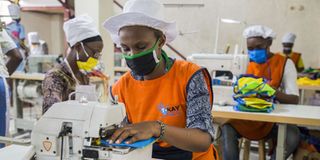Addressing barriers to women's workforce participation in Kenya

Women work at a garment factory. Most women work in the informal economy.
What you need to know:
- UN General Secretary António Guterres recently declared that the world is still 300 years away from achieving gender equity.
- This pessimistic outlook is supported by evidence indicating that progress for women is regressing globally.
In recent years, global discourse on gender equity has highlighted significant barriers preventing women from fully participating in the workforce. This issue is particularly pronounced in regions with entrenched patriarchal norms, such as the Middle East and North Africa (Mena).
However, Sub-Saharan Africa (SSA) faces similar challenges, and Kenya stands out as a country striving to bridge this gap. Understanding these barriers and developing multifaceted solutions can significantly enhance women's inclusion in Kenya's formal economy.
UN General Secretary António Guterres recently declared that the world is still 300 years away from achieving gender equity. This pessimistic outlook is supported by evidence indicating that progress for women is regressing globally.
High-profile setbacks, such as the US Supreme Court's overturning of Roe v. Wade and the Taliban's ban on girls' education, underscore the resilience of patriarchal systems.
Harvard professors Erica Chenoweth and Zoe Marks describe this trend as "the revenge of the patriarchs," which underscores the global pushback against women's rights.
In Kenya, as in many SSA countries, cultural values and legal frameworks often prioritise the rights of men. This results in systemic discrimination, where women are frequently excluded from formal employment.
Despite these challenges, Kenya has made notable strides towards gender equity, driven by legislative reforms, recent Cabinet appointments by President William Ruto, and the efforts of civil society. Yet, significant work remains to ensure these reforms translate into tangible improvements for women.
Entrepreneurship is often proposed as a solution to women's limited access to the formal economy. However, while entrepreneurship can offer opportunities, it also risks marginalising women further.
Many entrepreneurial programmes target specific skill sets and can inadvertently lead women away from stable, formal employment, thereby exposing them to exploitation and lack of social security benefits. In Kenya, it's essential to tailor these programmes to a broader range of women's needs and aspirations.
One of the critical steps towards enhancing women's workforce inclusion is addressing the data deficit. In Kenya, as in many parts of SSA, there is a lack of comprehensive data on women's employment experiences and the effectiveness of human resource (HR) policies.
Collecting and analysing this data is crucial for developing targeted solutions that address the specific challenges women face. For instance, the Sawi Project in Mena, which gathers extensive data on women’s work experiences, can serve as a model for similar initiatives in Kenya.
Data alone is insufficient; it must be used to inform policies and practices that promote inclusion. In Kenya, this means enacting new HR policies that address the unique challenges faced by women in the workforce. For example, ensuring safe transportation to and from work, providing day-care benefits, and establishing clear pathways for career advancement are critical steps.
The Sawi Project's approach of partnering with local employers to create inclusive policies can be replicated in Kenya to foster a more supportive work environment for women.
A coordinated effort is essential to drive meaningful change. Universities, civil society organisations, and government bodies must work together around a common agenda.
Academic institutions, in particular, play a vital role in fostering innovation and serving as hubs for positive change. By aligning their efforts, these institutions can help create a more equitable workforce, ensuring that women have access to dignified and sustainable employment opportunities.
Kenya's journey towards gender equity in the workplace is ongoing, but with concerted effort and targeted interventions, significant progress can be made.
By addressing cultural and legal barriers, utilising data to inform policy, and fostering a collaborative approach, Kenya can enhance women's inclusion in the formal economy. This will not only benefit women but also contribute to the country's overall economic growth and social development.
The writer is a senior policy adviser and gender consultant ([email protected]).





